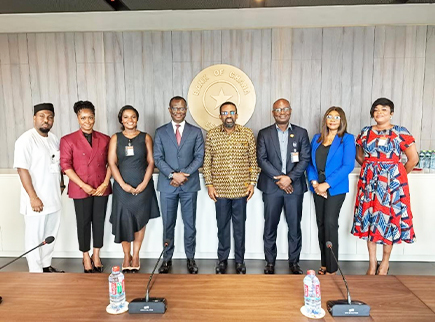Dr Paa Kwesi Baidoo, Chief Executive Officer (CEO) of the Komfo Anokye Teaching Hospital (KATH) in Kumasi, has met the governor of the Bank of Ghana (BoG), Dr. Johnson Pandit Asiama, and his management to court support for the retooling of the hospital.
The meeting, held at the headquarters of the bank in Accra, formed part of the sustained efforts by the KATH CEO to seek state and corporate funding to address some of the equipment and infrastructure deficit challenges facing the hospital.
The KATH occupies a unique position in the health care delivery system of the country as it receives referrals from 12 out of 16 regions by virtue of its strategic location and wide range of specialist services.
Regrettably, despite its highly skilled workforce and the huge demand for its services, it lacked the requisite stock of equipment and other infrastructure required for the comprehensive provision of specialist and sub-specialist care to the public, hence the drive by the CEO to reach out to corporate Ghana for support.

A statement signed by Mr. Kwame Frimpong, Public Relations Officer of KATH and issued in Kumasi, said Dr. Baidoo briefed the meeting which had in attendance, the two Deputy Governors of the bank and some other senior management on the obsolete nature of some of the existing equipment and the absence of other critical ones, whichwere impeding the delivery of cutting-edge clinical services to the public.
Dr. Badoo said: “Currently, most of the critical equipment such as C.T. scans, Magnetic Resonance Imaging (MRI), Fluoroscopy, Oxygen Plants and Central Sterilisation equipment at the hospital are either down or working at fault.
“Vital equipment like a Catheterisation Laboratory (CATHLAB) and Mammogram are not even available at all.”
He said since the state did not have the budget to fully address the above challenges, it would not be out of place if corporate entities like the BoG assisted with funding to procure such vital life-saving equipment to enable the hospital provide the best of specialist services to the public.
Dr. Asiama on his part, acknowledged that health facilities like the KATH, which were providing critical services to the public, deserved to be supported and the appeal made by its CEO would be seriously considered.
He said the management of the bank would study the list of the critically needed equipment submitted by the CEO and take a decision on what to do as soon as possible so that the hospital could be supported to serve the public better.

